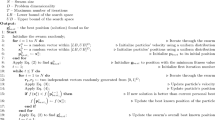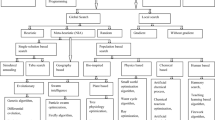Abstract
A hybrid Taguchi-based particle swarm optimization (HTPSO) method is developed for solving multi-objective flowshop scheduling problems (FSPs). Search performance is improved using Taguchi-based crossover to avoid scheduling conflicts. Instead of the conventional approach to selecting dynamic weights randomly, which ignores very small weight values for the objective, a fuzzy inference system is used. A numerical example is given to demonstrate the application of the proposed HTPSO and its good performance. The numerical results show that the HTPSO effectively enhances particle swarm optimization. The improvement achieved by the HTPSO also exceeds that obtained by existing methods for finding Pareto optimum solutions for FSPs. Therefore, the proposed HTPSO method effectively solves multi-objective FSPs.

Similar content being viewed by others
References
Sule, D.R.: Industrial Scheduling. PWS publishing company, Boston (1996)
Wu, C.; Gu, X.: A genetic algorithm for flowshop scheduling with fuzzy processing time and due date. In: Proceedings of the 5th World Congress on Intelligent Control and Automation, Hangzhou, pp. 2938–2942 (2004)
Chen, C.L.; Vempait, V.S.; Aljaber, N.: An application of genetic algorithms for flow shop problems. Eur. J. Oper. Res. 80, 389–396 (1995)
Murata, T.; Ishibuchi, H.; Tanaka, H.: Genetic algorithms for flowshop scheduling problems. Comput. Ind. Eng. 30(4), 1061–1071 (1996)
Cheng, B.W.; Chang, C.L.: A study on flowshop scheduling problem combing Taguchi experimental design and genetic algorithm. Expert Syst. Appl. 32, 415–421 (2007)
Arroyo, J.E.C.; Armentano, V.A.: Genetic local search for multi-objective flowshop scheduling problems. Eur. J. Oper. Res. 167, 717–738 (2005)
Tseng, L.Y.; Lin, Y.T.: A hybrid genetic local search algorithm for permutation flowshop scheduling problem. Eur. J. Oper. Res. 198, 84–92 (2009)
Ishibuchi, H.; Murata, T.: A multi-objective genetic local search algorithm and its application to flowshop scheduling. IEEE Trans. Syst. Man, Cybern. Part C Appl. Rev. 28, 392–403 (1998)
Ishibuchi, H.; Murata, T.: Multi-objective genetic local search algorithm. In: Proceedings of 3rd IEEE International Conference Evolutionary Computation, Nagova, Japan, pp. 119–124 (1996)
Ishibuchi, H.; Yoshida, T.; Murata, T.: Balance between genetic search and local search in memetic algorithms for multiobjective permutation flowshop scheduling. IEEE Trans. Evol. Comput. 7, 204–223 (2003)
Ishibuchi, H.; Yoshida, T.; Murata, T.: Selection of initial solutions for local search in multiobjective genetic local search. In: Proceedings of Congress on Evolutionary Computation, Honolulu, HI, May 12–17, pp. 950–955 (2002)
Murata, T.; Ishibuchi, H.; Tanaka, H.: Multi-objective genetic algorithm and its application to flowshop scheduling. Comput. Ind. Eng. 30, 957–968 (1996)
Murata, T.; Ishibuchi, H.: MOGA: Multi-objective genetic algorithms. In: Proceedings of 1995 IEEE International Conference on Evolutionary Computation, Perth, Australia, pp. 289–294 (1995)
Neppalli, V.R.; Chen, C.L.; Gupa, J.N.D.: Genetic algorithm for two-stage bi-criteria flowshop problem. Eur. J. Oper. Res. 95, 356–373 (1996)
Li, B.B.; Wang, L.: A hybrid quantum-inspired genetic algorithm for multi-objective flow shop scheduling. IEEE Trans. Syst. Man. Cybern. B, 37, 576–591 (2007)
Dugardin, F.; Yalaoui, F.; Amodeo, L.: “New multi-objective method to solve reentrant hybrid flow shop scheduling problem. Eur. J. Oper. Res. 203, 22–31 (2010)
Karimi, N.; Zandieh, M.; Karamooz, H.R.: Bi-objective group scheduling in hybrid flexible flowshop : a multi-phase approach. Expert Syst. Appl. 37, 4024–4032 (2010)
Yang, C.I.; Chou, J.H.; Chang, C.K.: Hybrid Taguchi-based genetic algorithm for flowshop scheduling problem. Int. J. Innov. Comput. Inf. Control, 9 (2013) (in press)
Visalakshi, S.; Baskar, S.: Multiobjective decentralized congestion management using modified NSGA-II. Arab J. Sci. Eng. 36, 827–840 (2011)
Soroudi, A.; Ehsan, M.: Application of a modified NSGA method for multi-objective static distributed generation planning. Arab J. Sci. Eng. 36, 809–825 (2011)
Pan, Q.K.; Tasgetiren, M.F.; Liang, Y.C.: A discrete particle swarm optimization algorithm for the no-wait flowshop scheduling problem. Comput. Oper. Res. 35, 2807–2839 (2008)
Jarboui, B.; Ibrahim, S.; Siarry, P.; Rebai, A.: A combinatorial particle swarm optimization for solving permutation flowshop problems. Comput. Ind. Eng. 54, 526–538 (2008)
Tasgeturen, M.F.; Liang, Y.C.; Sevkli, M.; Gencyilmaz, G.: A particle swarm optimization algorithm for makespan and total flowtime Minimization in the permutation flowshop sequencing problem. Eur. J. Oper. Res. 177, 1930–1947 (2007)
Tasgeturen, M.F.; Liang, Y.C.; Sevkli, M.; Gencyilmaz, G.: Particle swarm optimization algorithm for makespan and maximum lateness minimization in permutation flowshop sequencing problem. In: Proceedings of the 4th International Symposium on Intelligent Manufacturing Systems, Turkey, Sakarya, pp. 431–441 (2004)
Liao, C.J.; Tseng, C.T.; Luam, P.: A discrete version of particle swarm optimization for flowshop scheduling problems. Comput. Oper. Res. 34, 3099–3111 (2007)
Rahimi-Vahed, A.R.; Mirghorbani, S.M.: A multiobjective particle swarm for a flow shop scheduling problem. J. Comb. Optim. 13, 79–102 (2007)
Li, B.B.; Wang, L.; Liu, B.: An effective PSO-based hybrid alogrthm fo multiobjective permutation flowshop scheduling. IEEE Trans. Syst. Man. Cybern. A38, 818–831 (2008)
Sha, D.Y.; Lin, H.H.: A particle swarm optimization for multiobjective flowshop scheduling. Int. J. Adv. Manuf. Technol. 44, 749–758 (2009)
Kennedy, J.; Eberhart, R.C.: Particle swarm optimization. In: Proceedings of IEEE Conference Neural Networks IV, vol. 4, pp. 1942–1948 (1995)
Kennedy, J.; Eberhart, R.C.: A new optimizer using particle swarm theory. In: Proceedings of the 6th International Symposium on Micromachine and Human Science, Nagoya, Japan, pp. 39–43 (1995)
Shi, Y.; Eberhart, R.C.: A modified particle swarm optimizer. In: Proceedings of the IEEE International Conference on Evolutionary Computation, pp. 69–73 (1998)
Shi, Y.; Eberhart, R.C.: Empirical study of particle swarm optimization. In: Proceedings of the IEEE International Congress on Evolutionary Computation, pp. 1945–1950 (1999)
Eberhart, R.C.; Shi, Y.: Tracking and optimizing dynamic systems with particle swarms. In: Proceedings of the IEEE International Congress on Evolutionary Computation, pp. 94–100 (2001)
Eberhart, R.C.; Shi, Y.: Particle swarm optimization: developments, applications and resources. In: Proceedings of Congress on Evolutionary Computation, vol. 1, pp. 27–30 (2001)
Ratnaweera, A.; Halgamuge, S. K.; Watson, H.C.: Self-organizing hierarchical particle swarm optimizer with time-varying acceleration coefficients. IEEE Trans. Evol. Comput. 8(3), 240–255 (2004)
Chatterjee, A.; Siarry, P.: Nonlinear inertia weight variation for dynamic adaptation in particle swarm optimization. Comput. Oper. Res. 33, 859–871 (2006)
Ko, C.N.; Chang, Y.P.; Wu, C.J.: An orthogonal-array-based particle swarm optimizer with nonlinear time-varying evolution. Appl. Math. Comput. 191, 272–279 (2007)
Yen, J.; Langari, R.: Fuzzy Logic: Intelligence, Control, and Information, Prentice Hall, New Jersey (1998)
Hung, D.L.; Zajak, W.F.: Design and implementation of a hardware fuzzy inference system. Inf. Sci. 3, 193–207 (1995)
Montgomery, D.C.: Design and Analysis of Experiments, 3rd edn. Wiley, New York (1991)
Phadke, M.S.: Quality Engineering Using Robust Design. McGraw-Hill, New York (1989)
Tsai, J.T.; Liu, T.K.; Ho, W.H.; Chou, J.H.: An improved genetic algorithm for job-shop scheduling problems using Taguchi-based crossover. Int. J. Adv. Manuf. Technol. 38, 987–994 (2008)
French, S.: Sequencing and Scheduling: An Introduction to the Mathematics of the Job-Shop. Ellis Horwood Limited, Wiley, New York (1981)
Author information
Authors and Affiliations
Corresponding author
Rights and permissions
About this article
Cite this article
Yang, CI., Chou, JH. & Chang, CK. Hybrid Taguchi-Based Particle Swarm Optimization for Flowshop Scheduling Problem. Arab J Sci Eng 39, 2393–2412 (2014). https://doi.org/10.1007/s13369-013-0756-1
Received:
Accepted:
Published:
Issue Date:
DOI: https://doi.org/10.1007/s13369-013-0756-1




